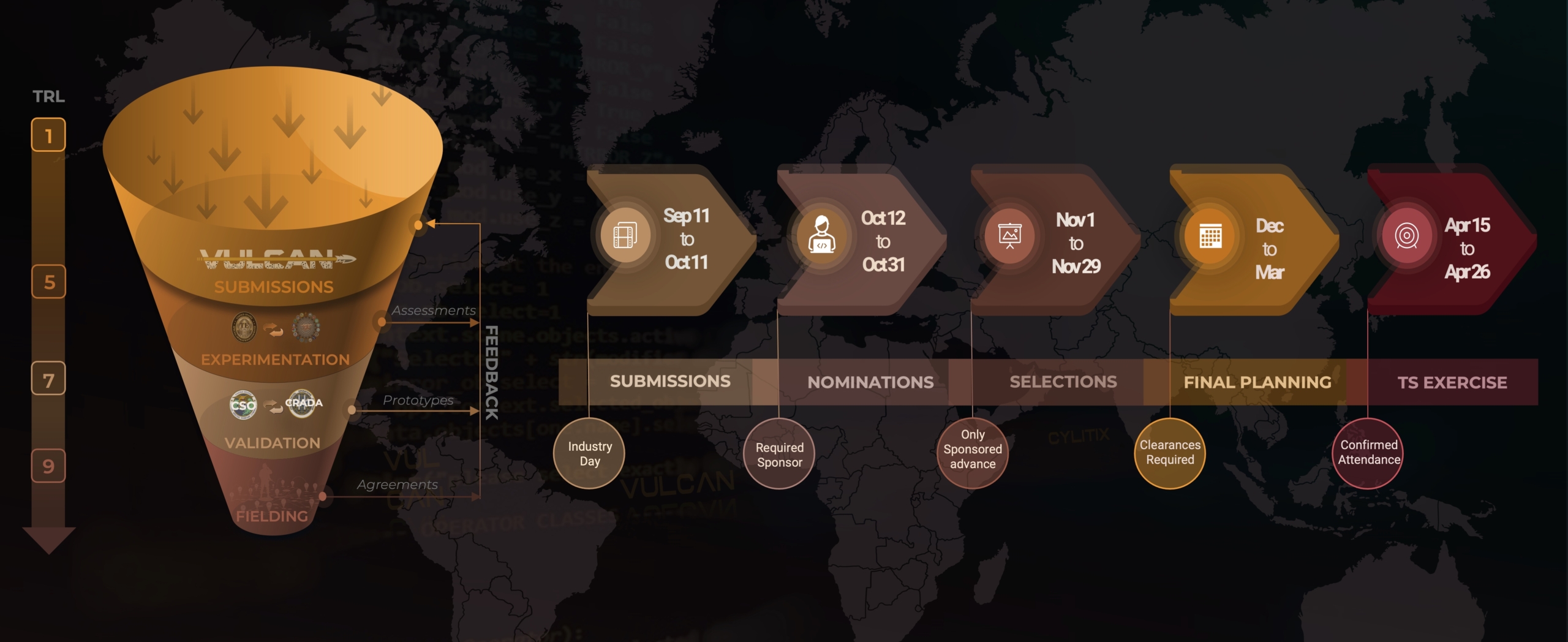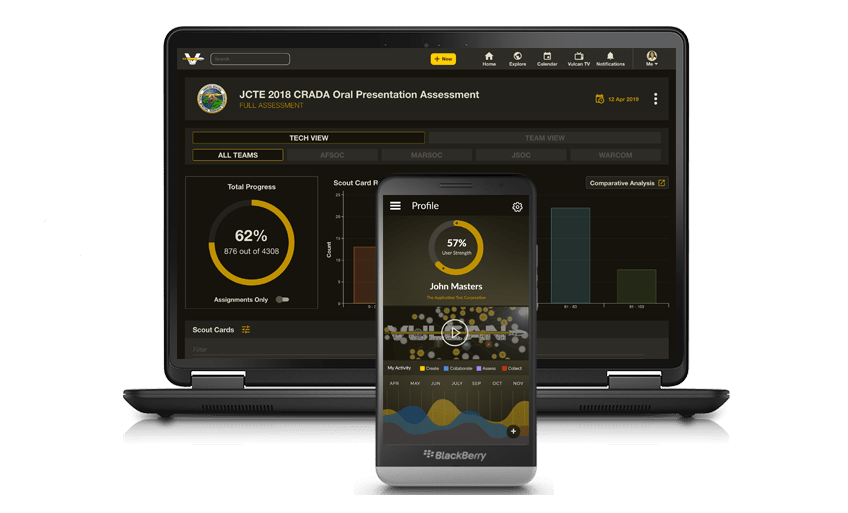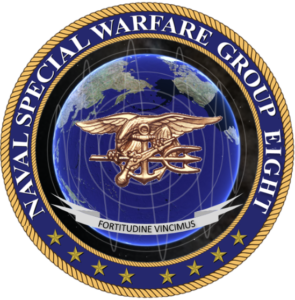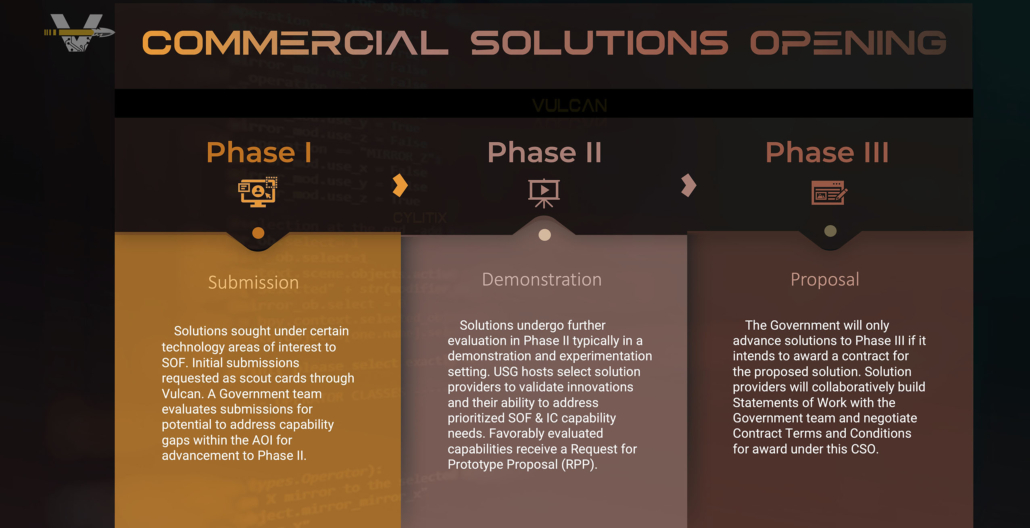WHO |
|
WHERE |
Joint Expeditionary Base Little Creek – Fort Story, VA |
WHEN |
15-26 April 2024 |
What is Trident Spectre (TS)?
TS is the Special Operations Innovation Proving Ground. It is an annual exercise focused on the integration of operations, intelligence, and technology, and comes together as a result of continuous planning and collaboration with joint inter-agency stakeholders. At the Core of TS planning are operational capability needs from the Special Operations and Intelligence Community.
What is a ‘project’?
A project is a technology, combination of technologies, or integrated concept that a Capability Provider (CP) submits and that a Government Sponsor nominates for TS24 Selection. A project can achieve different levels of validation at the Exercise depending on its maturity, its readiness, and operational viability. See process.
Who is a ‘Capability Developer (CP)’?
A Capability Provider is anyone from the broad innovation ecosystem that submits a technology or capability for nomination to TRIDENT SPECTRE.
Who is a ‘Government Sponsor (GS)’?
A Government Sponsor is anyone in the U.S. Government who nominates a CP’s capability for selection to TRIDENT SPECTRE. Projects must have a GS in order to be considered for selection.
The Process
Trident Spectre is executed according to a deliberate process that involves the solicitation, screening, nomination, and selection of viable projects for active experimentation during a two-week exercise.
The first phase of the process is an open submission phase whereby innovators can submit their capabilities without the required Government sponsorship. This allows for an early exposure of novel capabilities to Government stakeholders. Once the open submission window closes, then Government sponsorship becomes required. Government Sponsors are critical because they act as informed advocates for the capability during the nomination and selection phases of the process. They are also critical to helping Capability Developers navigate the TS process and ultimately execute successful experimentation if selected.
Selected projects are able to achieve various levels of validation during the exercise depending on their operational viability and performance:
Basic Validation: Project receive the 3 core assessments (Functional, Technical and Vulnerability) only. Basic validation Projects have lowest priority for scheduling and resources.
Intermediate Validation: Projects will receive the 3 core assessments plus ONE additional mission assessment (OPS, INTEL). Intermediate Projects will have second priority for scheduling and resources.
Advanced Validation: Project will receive all 3 core assessments plus TWO additional mission assessments (OPS, INTEL). Advanced Projects will receive highest priority for scheduling and resources.
Projects that achieve validation and address operational needs and priorities have the opportunity to be referred to USSOCOM, Joint and FVEY partners for partnered efforts or potential acquisition activities such as:
- USSOCOM Collaborative Research and Development Agreements (CRADA)
- NSW Commercial Solutions Opening (CSO)
- Other available FAR and Non-FAR instruments

Industry Day:
Industry day kicks off the annual process from a public engagement perspective and is an opportunity for the Naval Special Warfare team to outline its objectives for the exercise and provide helpful information to industry and academia on how to submit their capabilities to TS24.
Open Submissions:
The first phase of the TS process is an open submission phase whereby innovators can submit capabilities of interest without being required to identify a Government Sponsor. The objective of this phase is to allow for expanded discovery of novel concepts and capabilities with opportunities to identify them to Government stakeholders and sponsors for consideration in the nomination phase.
Sponsor Required:
At this stage of the process, all submissions MUST have a Government Sponsor (GS) identified. So, any new submissions in Vulcan will require a GS contact to be provided. GS can nominate the capability and advance it through the nomination phase and potentially onto the TS24 selection phase.
Nomination Phase:
While submissions continue, they now must have a Government Sponsor attached to the submission. Government Sponsors assumes responsibility for the coordination of the nominated project and work with the Capability Provider on any information needed to ensure the proper integration of the capability into the exercise.
The Platform
Trident Spectre is using Vulcan to execute all requisite discovery and assessment actions required in support of the Experimentation Exercise. Vulcan is an innovation scouting platform, sponsored by USSOCOM and used by diverse communities of practice to accelerate the delivery of innovative solutions to the national security enterprise. The platform is a fully networked solution on GovCloud(US) with end-to-end workflows supporting ecosystem engagement and collaborative scouting of technology solutions.
To participate in Trident Spectre, you must have a valid Vulcan account. So, if you do not have one yet, request it below.
Frequently Asked Questions (FAQ)
What is Trident Spectre?
Trident Spectre is the principal technology Proving Ground for Special Operation Forces and their partners in the National Security Community. Trident Spectre combines operational, technical, and Intelligence resources to provide an active exercise venue for technology integration, assessment, and validation. Selected capabilities engage dedicated Intelligence, Operations, and Technical resources within Special Operations ranges at JEB Fort Story, VA—and potentially integrated into Air, Ground, and Maritime platforms—for the purpose of validation with direct end-user input and feedback. TS also provides opportunities for Developer collaboration to create more effective integrations and potentially demonstrate them to Defense leaders who tour the experimentation Camp during the exercise
How do I submit a technology to Trident Spectre?
All submissions are received exclusively in Vulcan according to specific instructions provided in the call for submissions. The submission phase consists of an open invitation period and a subsequent sponsored-only period. In the first period, government sponsors are optional. This allows Capability Providers to expose their capabilities while pursuing Government sponsorship. Once the first period lapses, all submissions will require a government sponsor for the selection phase.
SUBMISSION PHASE FOR TS24 IS CLOSED
What is Vulcan?
Vulcan is an innovation scouting platform sponsored by USSOCOM that serves a diverse ecosystem and provides networked capabilities for the discovery and assessment of capabilities of interest to U.S. National Security. As a fully networked platform, Vulcan bridges the engagement divide between public and private organizations engaged in solving national security challenges.
How do I join Vulcan?
1. Click on button below
2. Click on “Join the ecosystem!” and follow the provided instructions.
What types of technologies is TS looking for?
Trident Spectre is focused on technologies that support the Special Operations mission, as well as the broader Defense and Intelligence community. Disruptive capabilities that specifically address SOF needs in the maritime domain are of prioritized interest, but the main objective is to validate capabilities of joint interest in collaboration with FVEY Partners. Capabilities can represent hardware, software, or integrated system solutions, but they must address the interest items referenced herein.
Who is a government sponsor and why do I need one?
Government sponsors are active-duty military, government civilians, or SETA support contractors who sponsor technologies to attend Trident Spectre.
Government Sponsors are required, because they play a major role in advocating for your capability during the selection phase. Second, they also help capability providers map their capabilities to mission requirements and align with the appropriate experimentation resources needed for you to succeed during the exercise.
TS is a Multi-Line-of-Effort exercise (Ops, Tech, Intel) that involves a demanding planning process across diverse resources and range facilities. It is critical that selected capabilities have the necessary inputs to navigate the exercise and execute experiments that produce validation assessments by end users.
Does the government sponsor need to take any action prior to the selection phase?
Yes. Government sponsors are required to verify their sponsorship of capabilities within Vulcan. They need to have an active Vulcan account and be able to discuss the capability in an in formed way during Government planning meetings. Therefore, interaction between capability providers and their sponsors is critical in order to achieve alignment with TS experimentation objectives and enhance probability of selection.
Can Trident Spectre Team help me find a government sponsor?
The TS team is providing an open submission window in the first phase of the process to identify compelling and innovative capabilities that do not have a Government Sponsor. The TS team will review submissions and present those it finds to be of interest to Government stakeholders. Stakeholders will review submitted capabilities and, if interested, elect to sponsor them. However, this remains purely consultative in nature. Please be proactive in finding a Government Sponsor that can advocate for your capability during the selection phase.
How do I inform Trident Spectre who my government sponsor is?
In your Vulcan submission, there is a field for Government References that will allow you to identify your Government Sponsor. Upon submission, the government sponsor will be notified of your selection and asked to either confirm their sponsorship.
Does my government sponsor need to have a Vulcan account?
Yes.
What do I need in order to be considered for selection for TS?
- Your submission must comply with all the TS submission requirements. All questions must be properly answered and correct information must be provided in the required Vulcan submission fields. It is advised to communicate your capability in a manner that is direct and clearly conveys its value proposition to SOF. The scout card can be leveraged to provide visualizations and information that communicate the novelty and/or the criticality of your capability.
- Each submission MUST gain a Government Sponsor before it can be considered for selection.
- The TS exercise is a classified event. So selected capabilities MUST have U.S. Cleared technical personnel at the SECRET level or above who are able to attend the exercise in person and execute the experiments in conjunction with Government teams. Attendees must be cleared personnel with technical knowledge and experience who will be able to coordinate, integrate, troubleshoot, and explain your capability in a live experimentation setting.
What is the process and/or methodology for selecting capabilities for Trident Spectre?
Trident Spectre involves a joint coalition of Government Stakeholders during the consultation process leading up to selection of capabilities. The team uses specific metrics to screen and evaluate submissions, and provides opportunities for Government Sponsors to advocate for the integration of specific capabilities into the experimentation plan for the exercise.
The metrics used in this process align with TS experimentation objectives, but allow for a deliberative engagement with Government Sponsors on the merits of specific integrations with an accounting for:
- SOF and IC Commander priorities and interest items;
- Available resources, assets, ranges to successfully execute the experiments;
- Desired validation level and targeted LOE objectives; and
- Scheduling and logistical constraints of the exercise.
How will my capability be assessed at the exercise if selected?
Trident Spectre aims to provide the opportunity for capabilities to be validated through several assessments, namely:
- Technical Assessment,
- Functional Assessment,
- Vulnerability Assessment
- Operational Assessment, and
- Intelligence Assessment.
Technical Subject Matter Experts, Special Operators, and Intelligence professionals conduct the referenced assessments and provide feedback to the CPs on their findings and recommendations.
See “The Process” section of this page for information on the different levels of validation that are available for TS participants.
Does TS team provide feedback on how my capability performed in assessments?
Yes. Assessment feedback is a cornerstone of the TS Process.
- Capability providers and their Government Sponsors receive extensive feedback at the exercise during experimentation and within the collaboration environment of the TS Camp.
- TS team produces UNCLASSIFIED assessment reports, which are made available in Vulcan.
- Additional details and classified inputs are available separately by request through authorized procedures, protocols and systems.
What is the NSW Resources Call and how is it different from the TS capability call?
The Naval Special Warfare Command issues calls for resources in support of its innovation activities and technology experimentation. The desired resources may support infrastructure such facilities, networks, platforms, etc. Part of that is specifically targeted to support the Trident Spectre Exercise. As such, it is NOT a call for TS experimentation project submissions, which is a separate process. Instead, it is a limited call for resources to support the experimentation infrastructure that will be set up to conduct the TS Exercise at Fort Story, VA.
- The benefits of participating as a TS Resource, include:
- Ability to collaborate with capability providers and Government sponsors throughout the exercise
- Learn the technical, functional, and interoperability benefits/constraints of the provided resource in relation to other capabilities, resources, and assets at the exercise
- Demonstrate the viability of the resource in specific use cases as applicable
- Interact with leaders and operators about opportunities for integration of the provided resource in other environments and contexts.
What is DV Day and what are its main objectives?
Distinguished Visitors (DV) Day in the context of TS, is held at the conclusion of the exercise and hosts leaders from across the Joint partner community. DV Day is an opportunity for:
- Government leaders to review the results of the experimentation and learn about the validation of specific capabilities of interest to the mission of their respective organizations.
- Capability Providers and Government Sponsors to explore leadership priorities in relation to their technologies and discuss potential pathways for their integration in operational environments.
- For all participants to develop concrete understanding of the relevance, performance, interoperability, and risk factors associated with specific applications and to chart the course for their maturation or potential adoption.
What is the NSW Commercial Solutions Opening (CSO) and how does it relate to TS?
The NSW Commercial Solutions Opening (CSO) supports USSOCOM efforts to accelerate the development, procurement and integration of unique capabilities into deployable warfighting capabilities for the benefit of the Joint Force and FVEY SOF partners. The CSO allows the Command to award FAR-based contracts under the authority of DFARS 212.70 in order to carry out projects that are directly relevant to enhancing SOF mission effectiveness. Areas of Interest (AOI) are:
- AOI 1. Operations: Innovative commercial items, technologies or services that can improve tactics, techniques and procedures and support the development of operational concepts. May also include Unmanned Systems and artificial intelligence technologies.
- AOI 2. Intelligence: Innovative technologies to meet intelligence and operational requirements, to include cyber and that which is required to achieve information and/or decision dominance.
- AOI 3. Multi-Domain Test and Evaluation: Innovative commercial items, technologies, or services that aid in one or multiple domains, including aviation experimentation, cyber/Internet of Things evaluation (to include penetration testing), maritime/undersea evaluation, communications testing and electromagnetic warfare analyses.
- AOI 4. Communications: Network and cyber security requirements to include network architecture and nimble programming / configuration for comms pathways. Survivable Command and Control such as Free Space Optics and next generation MANET systems. Signature Management in the RF Spectrum.
Trident Spectre experimentation and validation serves as a per-requisite to receiving Requests for Prototype Proposals (RPP) as part of this CSO. TS satisfies the demonstration requirement under Phase II of the CSO setting the conditions for the Government to advance solutions to the prototyping stage via a contract award.
The CSO is a potential exit pathway following successful TS experimentation.
What is the USSOCOM CRADA and how does it relate to TS?
USSOCOM Collaborative Research and Development Agreement (CRADA) is a legal agreement between a USSOCOM and a non-Federal partner to cooperatively conduct research and development (R&D) consistent with USSOCOM mission(s) and share the results derived from the effort. CRADAs, are not procurement contracts and are therefore not subject to the requirements of the Federal Acquisition Regulation; however,
- CRADAs will not be used to circumvent the normal procurement process.
- Under a CRADA, the non-Federal partner can provide facilities, equipment, personnel, funding, and other resources toward the conduct of the R&D effort. The government partner can provide the same things except for funding.
- The government cannot provide funding under a CRADA or it would be considered a contract and then come under control of the Federal Acquisition Regulations.
- USSOCOM does not enter into a CRADA with a foreign owned or controlled interest partner.
CRADAs can be used by USSOCOM as a collaborative instrument to help inform the maturation of capabilities of interest that were assessed and validated during Trident Spectre. USSOCOM PEOs, Components, or Units can work with Capability Providers and their Government Sponsors to develop Integrated Work Plans (IWP) under a mutually executed overarching CRADA agreement. Such IWPs can guide the next steps in the process of maturing capabilities to potentially address specific gaps and navigate towards adoption / acquisition.
The CRADA IWP is a potential exit pathway following successful TS experimentation.
Contact Support
- For Vulcan technical support, you can email us at support@vulcan-sof.com.
- For Trident Spectre technical questions you can email TridentSpectreAdmin@socom.mil.







